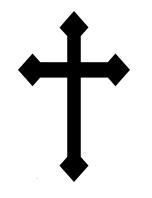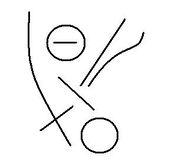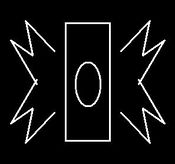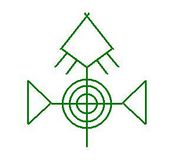Difference between revisions of "Lucavi"
GnomeWorks (Talk | contribs) (→Ajora) |
GnomeWorks (Talk | contribs) (→Crusader) |
||
| Line 285: | Line 285: | ||
'''Title:''' The Judge | '''Title:''' The Judge | ||
| − | '''Symbol:''' | + | '''Symbol:''' White fist on red sun |
'''Alignment:''' Lawful Neutral | '''Alignment:''' Lawful Neutral | ||
Revision as of 09:39, 6 March 2011
The term "lucavi" is taken from Square-Enix's Final Fantasy Tactics, as well as some of their names and concepts. Yothoth, specifically, is based on the Chtulu mythos of Lovecraft. The term 'char' is taken from Stephen King's Gunslinger series, and is used in relatively the same sense as those novels.
Contents
Overview
The Sect of the Lucavi is a secretive organization, only loosely organized as a central religion; most followers worship a specific Lucavi, while only paying marginal homage to the others. It is believed that the Lucavi have more infernal and abyssal worshippers than mortals, though this is mere conjecture and cannot be confirmed. Where the Lucavi came from is also largely unknown - unlike the Saints or Eidolons, they sprang up slowly and independently.
Worship: Temples are rare and lavish, though this depends on the Lucavi; worship of the Lucavi is generally frowned upon, and local laws may impose imprisonment or even death on those practicing worship of the Lucavi. Worship of the Lucavi is highly ritualized and controlled. Each Lucavi has their own mode of worship. Lucavi are considered gods by those who worship them, and are understood to each represent a purpose, a particular world-view.
Organizations: The Sect of the Lucavi
Classes: Antipaladin
Prestige Classes: Servant of the Lucavi
The Lucavi
What follows are general overviews of each of the Lucavi.
Ajora
He Who Betrays, Scion of the Lucavi, Fist of the Rebellion, The Godslayer, He Who Rules
Greater Lucavi
Title: The Blood Angel
Symbol: Black cross on white
Alignment: Neutral Evil
- Ethos: White/Black/Blue
Portfolio: Divinity, control
Priest Alignments: LE, NE
- Priest Ethoi: Black @ d10, White anti-red virtues @ d8, Blue anti-red virtues @ d6, Blue anti-green virtues @ d6
Domains: Ajora
Favored Weapon: Bastard Sword
Organizations: The Godslayers
Prestige Classes: Godslayer
Description
Ajora appears as an angel, garbed in full plate made of adamantine, wielding a bloodied greatsword, with white wings splattered with blood. While originally male, upon being adopted as an angel of Kolaita, he gained the ability to appear in a form more similar to his patron deity, appearing as a female version of himself; as such, he can opt to appear as either form. While some groups that follow him specifically revere one form or another, more learned churches of Ajora recognize that he is male, but can appear as female, and as such are surprisingly equal in terms of gender representation.
Of all the Lucavi, Ajora is the most ruthless. While not an original Lucavi, he quickly rose in rank, displacing the original head of the sect by virtue of his sheer determination in attaining the position. He has no qualms with doing what must be done to achieve his ends - he is comfortable with both holding by the letter of the rules and breaking them completely in the course of a plan: his word is only his bond until he sees fit to break it. He is opportunistic, ruthless, and vengeful; as a Shard of an older deity, he is the very embodiment of these qualities.
Among the divine communities, Ajora is one of the most feared beings remaining in creation, being the only being to have slain a deity without resorting to use of the Wandering to do so. His presence is a constant reminder that Shards, no matter how seemingly loyal they are, retain the potential for self-expression and can break from their patrons, with potentially disastrous results.
Dogma
There is an order to existence, but it can always be subverted. Become the master of your own destiny, and take fate into your own hands - do what you feel you must to achieve what you feel you are meant to achieve. Keep your word when appropriate and break it when the time comes: do whatever it takes to keep your enemies off-guard. Find your purpose and do all you must to fulfill it.
Zalera
Title: The Char
Appearance: A pale angel with black wings and jet-black hair, wielding a katana.
Worship: Unknown.
Titles: Angelslayer, He Who Hunts, Angel of Death
Organizations: None
Prestige Classes: Mortalhunter
A rogue char, Zalera hunted the avoral Akexea for many years. Impressed with his tireless hunt, Ajora offered him a place among the Lucavi, as his right hand. Zalera reluctantly accepted, though he quickly showed that he was not willing to be beneath Ajora in the pecking order of the Lucavi - after a drawn-out duel, Zalera was accepted as one of the proper Lucavi.
Proud and determined, Zalera is not one to be trifled with. Though he is a full member of the Lucavi, he still accepts targets from Ajora, and in that sense is somewhat subservient. However, this goes for all the Lucavi - if they wish someone to be slain, they speak with Zalera.
Of all the Lucavi, Zalera has the fewest outsider followers - all chars pay homage to him, as do some of the more malicious demons and devils. However, Zalera's primary worshippers are mortals, rangers and assassins who see him as the ultimate dealer of death.
Adrammalech
Title: The Wrathful
Appearance: A balor, wreathed in flame, with glowing red eyes, wielding a massive zweihandir.
Worship: Unknown.
Titles: He Who Rages, The Angry, Hatred Incarnate
Organizations: None
Prestige Classes: None
A powerful demon in his own right, Adrammalech commanded the obedience of those around him - when the gods fell, he ascended shortly, his underlings kneeling and scraping in fright of the new order. Adrammalech smiled, and met with Ajora on whatever plane the Lucavi convene.
Always hateful, always angry, Adrammalech's rage is fuelled by the rage and anger of the mortal races: with every hateful word, every angry glance, Adrammalech grows more powerful. He feeds on this rage, though it threatens to consume him from within. Adrammalech rarely manages to keep his anger in check, though he and Ajora have reached an understanding on this, and Ajora often speaks for the balor when the Sect convenes - a fact which angers Adrammalech all the more, as Ajora is more than likely manipulating Adrammalech, but he is powerless to stop the fallen angel... for now.
Velius
Title: The Warlock
Appearance: An aged, decrepit human, wreathed in crackling black energy and flame.
Worship: Main temple in Wayverith, in a necromancy school.
Titles: He Who Commands, Commander of Demons, Lord of the Pit
Domains: Evil, Pact, Portal (PGF), Summoner, Tyrant
Organizations: None
Prestige Classes: Demonologist
Not all of the Lucavi were fallen or traiterous angels - some of their ranks were chosen from the mortals of the world, and Velius was one such mortal. A leading member of the Wayveri family, Velius Wayveri was a very well-respected warlock, trained in the arts of necromancy and illusion. When the gods fell, Elidibs went to Velius, whispering to him that the warlock could attain deific power, if only he demanded it from the demons and devils. Elidibs had done so to stir up the denizens of the underworld so that he could take them as his minions, but Velius foiled his plans.
Summoning a balor, Velius commanded it to take him to the hiding place of the mysterious voice that had come to him. The balor, knowing of the rise of the Lucavi, took him to Ajora. Seeing the mortal's power, Ajora convinced Velius to command worship of the various demons and devils he had summoned, bolstering the strength of the warlock and the Lucavi. Velius agreed, and summoned various demons and devils for three days, from dusk until dawn, binding each one to his will and forcing them to submit to him in worhsip. At dawn of the third day, Velius ascended, and joined the ranks of the Lucavi.
Teniel
Title: The Beast
Appearance: A savage beast, vaguely resembling a mix of an owlbear and gryphon.
Worship: Main sancutary deep within the Berlian Forest of Chaliraz.
Titles: The Screaming Monstrosity, The Ruiner, Slayer of Men
Organizations: None
Prestige Classes: Geomancer
Teniel represents the savaged earth, the misshapen beasts of the world, and the savage instincts of all sentient beings. He is an incoherent creature, screaming constantly in pain and rage, ravaging the world as his form has been ravaged. If the strange creatures encountered throughout the world were capable of worship, they would revere Teniel.
Teniel's ascension is a source of curiosity among scholars, as it does not seem that any sane being would worship such a crazed beast. However, it is believed that druids were the cause of his ascension: angered with industrialization of the world, they went mad with hatred for civilization, and began worshipping a beast they encountered in the dark woods of Adnez.
Teniel's domain is nature; he vies with the Eidolons for general control of the natural world. However, even though he represents nature among the lucavi, he represents the twisted ways of the world, the conquering of reason by instinct, of culture by savagery.
Hashmalum
Bringer of Order, The Iron Fist
Intermediate Lucavi
Title: The Regulator
Symbol: Icon of Regulation (see below)
Alignment: Lawful Evil
Portfolio: Order, loyalty, tactics, law
Worshippers: Tacticians, lawbringers
Priest Alignments: LN, LE, NE
Domains: Hashmalum
Favored Weapon: Gunblade
Organizations: None
Prestige Classes: None
Description
Hashmalum is a powerfully built minotaur, horns gleaming of orichalcum, wielding an overly large mutli-barreled gunblade with an axehead in place of a standard blade. The fur covering his face is white and well-trimmed, while the rest of his fur is generally dark brown in color. He wears only pieces of armor, but the armor he does wear is black plate.
Hashmalum is most well-known for having originally been a servant of a powerful demon; after the fall of the old deities, however, his renown for lawfulness and loyalty was noticed by Ajora, and he was given a seat amongst the Lucavi, as much to inforce order on Ajora's behalf as anything else.
Hashmalum is the patron lucavi of tacticians and lawbringers. His name is invoked by those who seek to bring order, no matter the cost, and those who hope to see their tactical decisions succeed.
Dogma
Law and order must be maintained, at any cost. Loyalty is the most important trait one can have - be loyal to those in power, to the death and beyond. There is no room for mercy. Slay those who upset the balance of law: shoot first, ask questions later. Order is a tool for those in power; serve the most powerful, and you will find power for yourself. Remember your debts, and always repay them in full.
Clergy and Churches
Hashmalum's followers often garb themselves in black, wearing a simple silver chain with the icon of regulation embossed upon it. The more martially-minded amongst them also wield specially-crafted gunblades, made to resemble Hashmalum's. Iconic priest gear for Hashmalum includes a horned helmet, meant to resemble Hashmalum's horns: while not often worn in places where the lucavi are frowned upon, they are the best indication that a given person is a priest of Hashmalum.
Hashmalum's temples are small and orderly; they oftentimes serve as a court of law, in lands where open worship of the lucavi is accepted. Hashmalum's temples often also double as a training ground of sorts for new devils, as the standing of such beings is often heavily reinforced in these temples. Particularly loyal chars who are not personal servants of Zalera may also be found amongst the regular residents of any given Hashmalite temple, the belief that loyalty will be rewarded often prevalent amongst them.
Hashmalite temples are often found underground, in cities with particularly lawful bents. Despite any local laws that may forbid the worship of lucavi, Hashmalites often excuse themselves as working under the law of the lucavi, not of any mortal; this response is used to reason away their blatant lawbreaking. Hashmalites are only concerned with the laws of the lucavi.
Rites and Rituals
Executions are particularly important Hashmalite rites, being seen as the ultimate punishment for unlawful infractions. Less severe punishments, such as whippings, are seen as less powerful rites, but still used: regardless, the penalty for breaking most lucavian laws is death by execution, if a Hashmalite has anything to say about it.
Recitation of the entire codex of lucavian laws is amongst the rituals in which Hashmalite priests partake, and it is often during this recitation that Hashmalite priests pray; this ritual is often undertaken at dawn, when executions normally take place.
Holy Days
Relofis 2: Hashmalum's Ascendance
Legends
It is uncertain how Hashmalum came to be in the service of a devil, though some legends persist that it was due to an unusual geas, cast upon Hashmalum by a well-meaning priest of an old god. It is said that, at the time, Hashmalum had been highly destructive and chaotic, and the priest sought to teach the minotaur a lesson about listening to one's elders; Hashmalum somehow managed to interpret this in such a way as to require serving a devil. Hashmalite priests often deny this legend, saying that Hashmalum had always been a particularly law-abiding minotaur, and sought to serve a devil as a means to further understand how far loyalty could go.
Elidibs
He Who Lies, Spinner of Tales, Diplomat of the Lucavi
Intermediate Lucavi
Title: The Manipulator
Symbol: Silver puzzle piece on grey
Alignment: Neutral Evil
Portfolio: Strategy, diplomacy, spies, wit
Worshippers: Diplomats, spies, mimics, mediators
Priest Alignments: LE, NE, CE, N
Domains: Elidibs
Favored Weapon: Darts
Organizations: The Mercurials
Prestige Classes: Mercurial Initiate
Description
If Elidibs has a natural form, none know what it is. Some say he may be a doppelganger, while others claim he sold his soul for such power. Regardless, his appearance varies wildly, the only staple of his attire being a simple grey, horned mask.
Elidibs is the patron lucavi of strategy, diplomacy, and wit. His name is invoked by those hoping for successful negotiations, as well as by those who seek to manipulate others to their own ends.
Dogma
The meaning of words is slippery; use this always to your advantage. Smile at your foes, even as you end their lives; the facade must never be broken. Keep your wits about you, and always be ready to put them to use to further your goals. Profit from the work of others, and ensure that you always have an alibi if something goes wrong.
Clergy and Churches
Elidibs' followers are incredibly difficult to recognize, as he stresses the importance of disguise. As such, Elidibian priests will often carry their holy symbols in their pocket or similar hidden space on their person, keeping it close but out of sight. Elidibian priests often enjoy debates and games of skill; they are often found harassing priests of Jareth, though with appropriate disguises.
Elidibs' temples are always well-hidden, often masked as a simple shop or storefront. His temples have many secret doors and traps, which discourage investigation and encourage heightened awareness on the part of his priests. Entry into an Elidibian temple often requires the answering of riddles, which oftentimes have no right answer.
Elidibian priests often seek to gain entry into governments or mercantile establishments, so as to better manipulate the world. Elidibians do not believe in direct action, but instead seek to profit from the work of others, using their power and influence to their own ends.
The head Elidibian temple is said to be located in Vesuva, deep within the bowels of a school for mimics, hidden behind a labyrinth of dead-ends, traps, and sliding doors.
Rites and Rituals
Elidibs requires that his followers maintain a silver tongue, and as such any engagement in riddles or debates is seen as worship of him. In particular, arguing for a position with which one disagrees is seen as particularly devout.
Elidibian priests keep a repertoire of false names and identities with which to work; his priests study these at first nightfall, and they often recite their prayers while doing so.
Holy Days
Quellosian 7: Elidibs' Ascension
Legends
Some say he is a doppelganger from long ago, who was pressed into the service of devils; others say he is a changeling who sold his soul for power. Still others say that, while a mortal, he somehow managed to trick Ajora into giving him a seat amongst the Lucavi, and Ajora was so impressed with this feat that he allowed Elidibs to stay.
Kali
Title: The Seductress
Appearance:
Worship:
Titles:
Organizations:
Prestige Classes:
Falriox
Title: The Destroyer
Appearance:
Worship:
Titles:
Organizations:
Prestige Classes:
Crusader
The Dark Judge, The Righteous, The Crusader
Intermediate Lucavi
Title: The Judge
Symbol: White fist on red sun
Alignment: Lawful Neutral
- Ethos: Black/Blue/White
Portfolio: Justice, righteousness, balance, law
Worshippers: Paladins, lawbringers, judges
Priest Alignments: LN
- Priest Ethoi: Anti-red virtues @ d10, Blue anti-green virtues @ d8, Black anti-green virtues @ d6
Domains: Crusader
Favored Weapon: Hammer
Organizations: None
Prestige Classes: None
Description
Crusader appears as an older, tall human male, wearing gleaming gold plate armor and wielding a massive two-handed hammer.
Crusader was once a mortal, who was once - in ages long lost - a Saint. However, his overbearing insistence on attaining followers, combined with his zeal for pursuing justice with no sense of compassion, eventually landed him a seat amongst the Lucavi. While he is counted amongst them, Crusader holds most of his fellow lucavi in disdain, and his followers will gleefully destroy followers of other lucavi if a situation calls for it. Similarly, however, Crusader has little to no respect for the Saints.
Due to his unusual position, most of Crusader's followers find themselves standing alone. While some lucavi and saints get along well with him and his followers, most of both sets of Scions prefer to avoid him and ostracize his followers when possible. This, in turn, fuels their righteous indignation, and so the circle continues.
Crusader is the patron lucavi of indifferent law and merciless righteousness. His name is invoked by those who seek to instill order, bring justice to those who deserve it, and by those who need no higher justification for their actions than the law as written.
Dogma
Law is the only means by which civilization can be maintained, and to break the law is the highest sin a man can commit. Know what must be done, and have faith that your actions are righteous. Spare not the dark nor the light, if the law of the land has been broken. Judge with a blind eye and a heavy hand, for only then can the world be kept safe.
Yothoth
Title: The Horror
Appearance: An indescribable being, green in coloration, vaguely resembling an illithid.
Worship: Unknown.
Titles: That Which Cannot Be, The Dreaming, The Nightmare
Organizations: None
Prestige Classes: None
The slaad are an interesting breed of creatures, one that rarely interacts with the various peoples of Trinity. However, there are occasional slaad which venture forth from whatever madness they dwell in - Yothoth is one such slaad. A powerful member of his race, he stepped forward when the Lucavi were assembling themselves, and demanded that he be counted amongst them.
Backed by worship of the slaad, Yothoth is the lord of chaos and madness, insanity and things that truly should not be. In this, he shares a certain amount of kinship with Teniel - they are both random mutations, the result of either mad wizardry or forces beyond their control. However, where Teniel represents nature and primal savagery, Yothoth is the representative of a more dignified type of insanity.
Worship of Yothoth is restricted to those who can only be described as "insane," and an unusually high number of Force practitioners of the Trinity of Reality are counted among its worshippers. They speak of a being which will destroy all life when the stars are right, which slumbers deep within the oceans.
Sko'veyux
Title: The Pain
Appearance: A tortured elven woman, with shattered metal wings, missing an eye, a bloody cloth wrapped around her forehead, hands, and feet.
Worship: Main temple in Murond, resembling a brothel.
Titles: The Brutalized, She Who Damns, She Who Shares
Organizations: Sisterhood of Pain
Prestige Classes: Sister of Pain
Sko'veyux is one of the more unique Lucavi, ruling over the realms of pain, sadism, slavery, and torture. She is a harsh mistress, and becoming one of her chosen requires great sacrifices on the part of the would-be devotee - Sko'veyux feels that only those who can pass her tests without losing their sanity or taking their own lives are worthy of her favor.
Sko'veyux herself was originally a char, a particular breed of dark angel whose purpose was to serve the dark gods in finding and eliminating the followers of other deities. When the gods passed from the world's attention, however, Sko'veyux saw an opportunity, and seized it, claiming the devotion of her fellow chars as her own and thereby ascending to semi-deityhood. Rejected by the Saints, she joined the other Lucavi.
Her followers are the damned and broken, those who have lost much and have nothing else to lose. Her priesthood - all female - are renowned for their unearthly beauty, though often marred by scars on the arms, hands, and feet. They are also known in darker circles for their skill with torture devices, and more vile occupants of the world seek out the Sisterhood of Pain when their own are unable to come up with appropriate torturing techniques.















